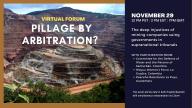The deep injustices of mining companies suing governments in supranational tribunals
When: Wednesday, November 29, 11am PST / 1pm Mexico & Guatemala / 2pm EST & Colombia / 7pm UK
Where: Zoom / Facebook live – The event will be held in both English and Spanish; there will be simultaneous interpretation via Zoom. Register here for the online event on Zoom.
With participation by:
- Juan Camilo Sarmiento, Committee for the Defence of Water and the Páramo of Santurbán (Colombia)
- Jakeline Romero Epiayu, Wayúu Women's Force (Colombia)
- Álvaro Sandoval (replacing José Angel Llamas), Peaceful Resistance La Puya (Guatemala)
With comments by:
- Stuart Trew, Canadian Centre for Policy Alternatives (CCPA)
- Diana Salazar, London Mining Network
- Aldo Orellana López, Terra Justa
- Jen Moore, Institute for Policy Studies - Global Economy Program
In September 2021, a divided tribunal in the arbitration between Canadian mining company Eco Oro and the Colombian government found that Colombia’s decision to prohibit mining activities in high-altitude wetlands important for the provision of water to over a million people – known as páramos – did not amount to an unlawful expropriation, but violated the investor’s right to a minimum standard of treatment. Even though the Tribunal found that the measures adopted by the country were a legitimate exercise in environmental protection, it determined that Colombia’s measure was unfair and manifestly arbitrary.
This case is not yet over, but the potential implications are unsettling for environmental protections, given the chilling effect this could have on future decisions concerning mining projects, and for other arbitration cases in Colombia and globally that deal with social and environmental concerns. Worse, there are many other mining companies suing Colombia and other governments in the region for measures that communities have fought for long and hard – and at great risk to themselves – to protect their lives and lands from the harms of mining, including Anglo American and Glencore, suing Colombia over the Cerrejón coal mine, and Kappes Cassiday & Associates (KCA), suing Guatemala over the El Tambor gold mining project.
Join us to talk with grassroots movements in Colombia and Guatemala about their struggles and the dangers and injustices of Investor State Dispute Settlement (ISDS) enshrined in the Canada-Colombia Free Trade Agreement and thousands of other international investment agreements worldwide. We will discuss how they threaten their territories, water and sovereignty, as well as what we can do to support their movements and take greater action at home.
More about the communities:
Committee for the Defence of Water and the Páramo of Santurbán is a broad coalition of about forty civil society organizations based in the city of Bucaramanga, Colombia that has struggled to defend the high altitude páramo ecosystem and water supply from the threat of gold mining for nearly a decade.
Wayúu Women's Force is an alliance of Wayúu communities and organizations that makes visible and denounces the violations of their rights as a result of the implementation of mining megaprojects, forced displacement and the militarization of the territory of La Guajira. Wayúu women have historically organized in defence of their land, environment and self-determination in Colombia.
Peaceful Resistance La Puya consists of communities from San Pedro Ayampuc and San José del Golfo, just north of the city of Guatemala, who have struggled against gold mining for almost ten years given the irreversible environmental impacts of this activity and the danger it represents for the lives of people, animals and plants.
ORGANIZERS: Canadian Centre for Policy Alternatives (CCPA) – Center for International Environmental Law (CIEL) – Earthworks – Institute for Policy Studies (IPS) - Global Economy Program – MiningWatch Canada – Terra Justa – London Mining Network – Colombia Solidarity Campaign
